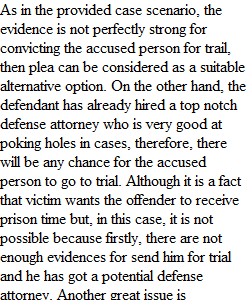


Q When discussing ethical dilemmas that are unique to the legal profession, the topic of plea bargaining oftentimes comes up. "In a plea bargain, the defendant agrees to plead guilty, usually to a lesser charge than one for which the defendant could stand trial, in exchange for a more lenient sentence, or so that certain related charges are dismissed. (From FindLaw at http://criminal.findlaw.com/criminal-procedure/plea-bargains-overview.html ) Imagine you are a case consultant working for the district attorney's office where you are presented with the ethical dilemma surrounding the prosecution of a burglary case. A thorough investigation was conducted and all logical leads have been exhausted. You are informed there is evidence available suggesting the defendant is guilty; but upon reviewing the evidence, you determine it might not be strong enough to support a conviction if the case goes to trial. Additionally, the defendant has hired a top-notch defense attorney who is very good at poking holes in cases. However, the victims are upset and want to see the offender receive prison time. You realize that these victims are taxpayers, so they pay your salary. You also realize that the defendant is likely to receive jail time if the case proceeds to trial and a jury find the defendant guilty. The defendant is willing to plead guilty in return for a sentence of probation, and you believe that this is a fair punishment, particularly in light of the overcrowding of the local correctional facilities. What should you do? Support your decision by constructing a logical argument for the course of action you choose. Remember to cite your supportive resources.
View Related Questions